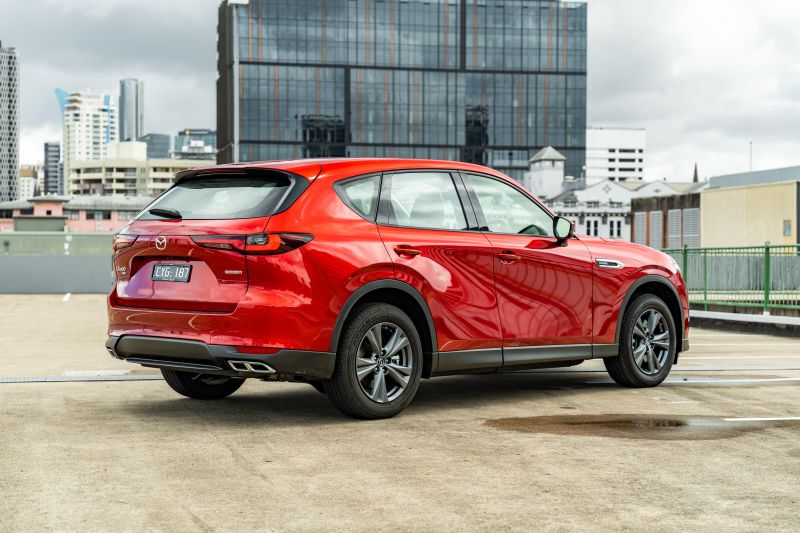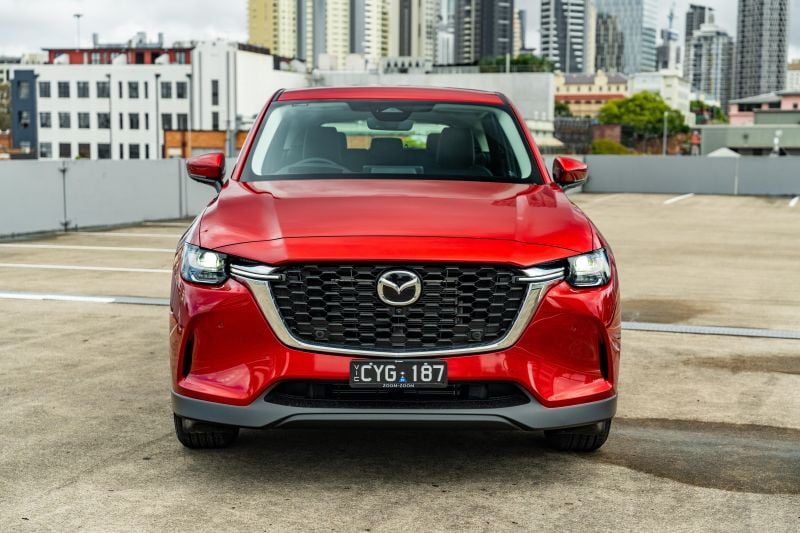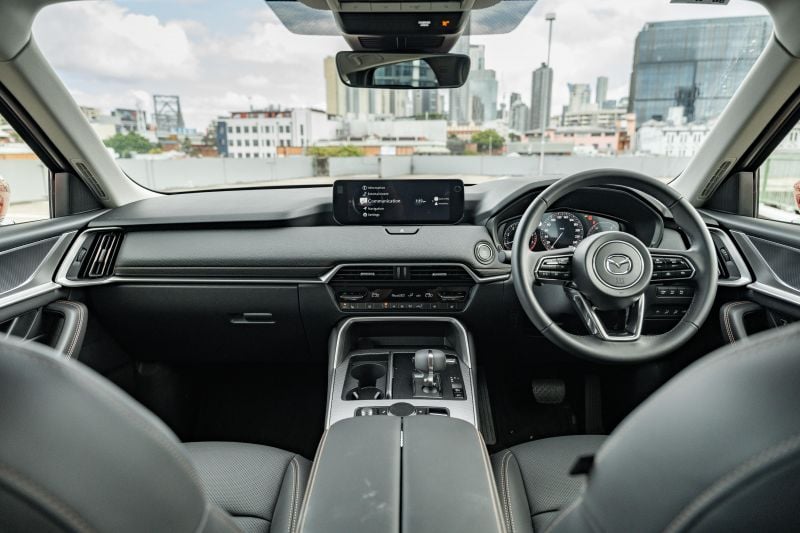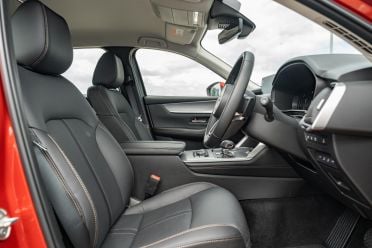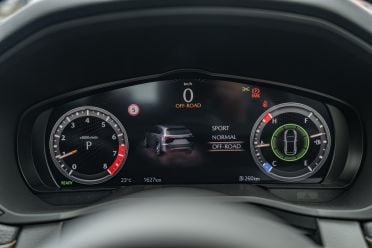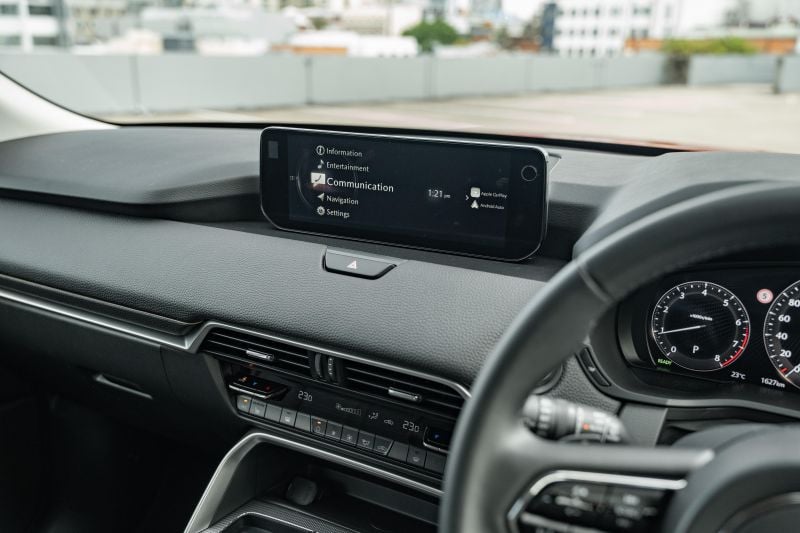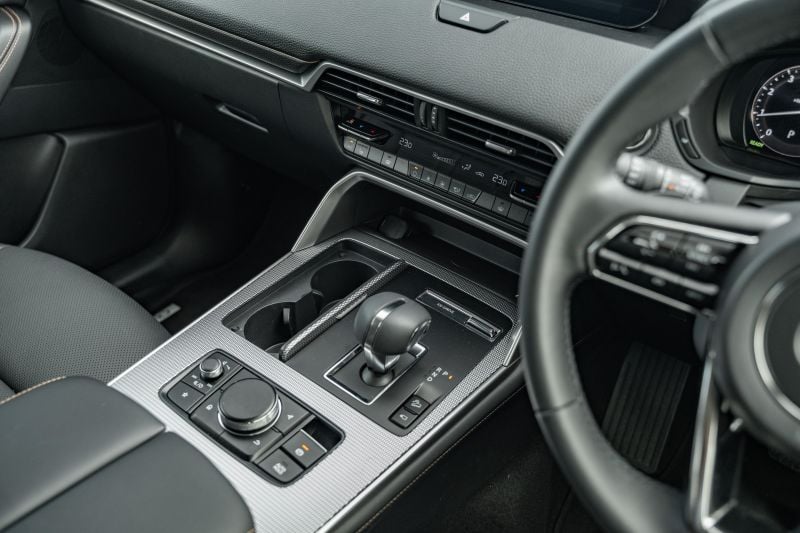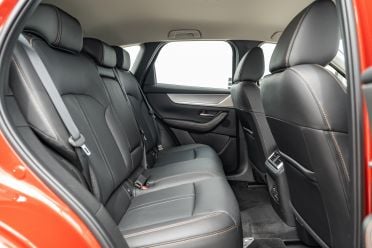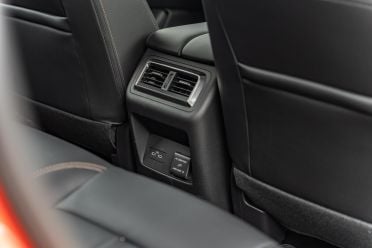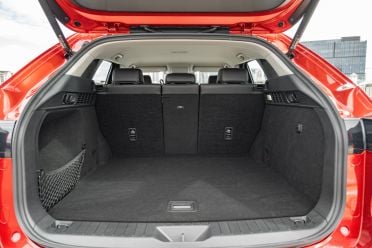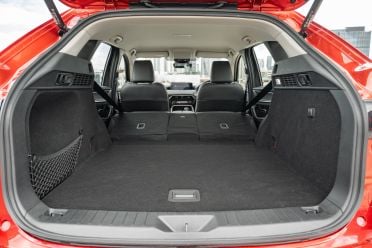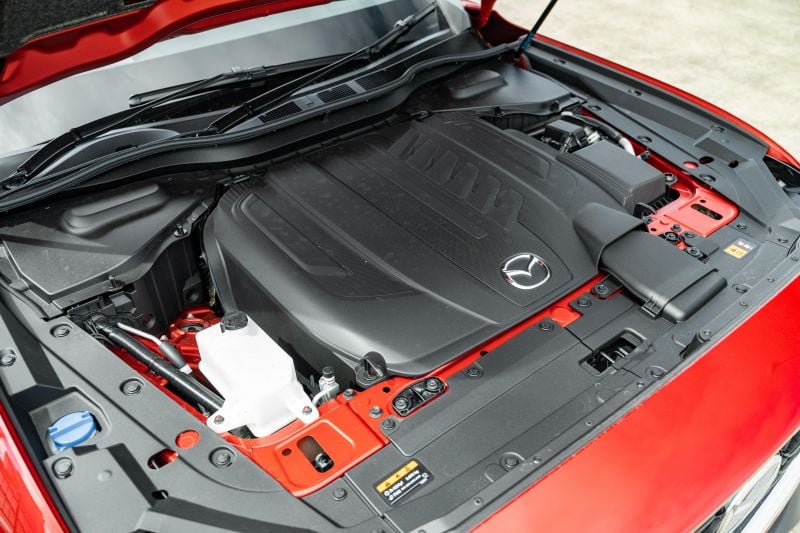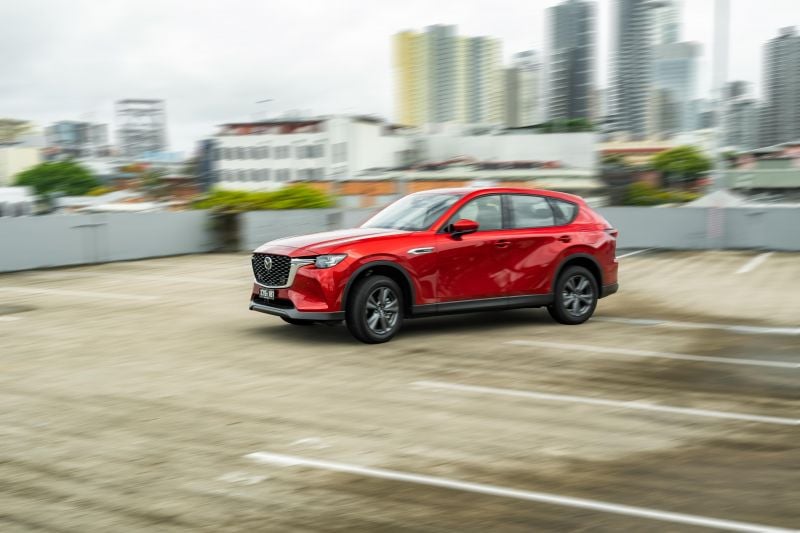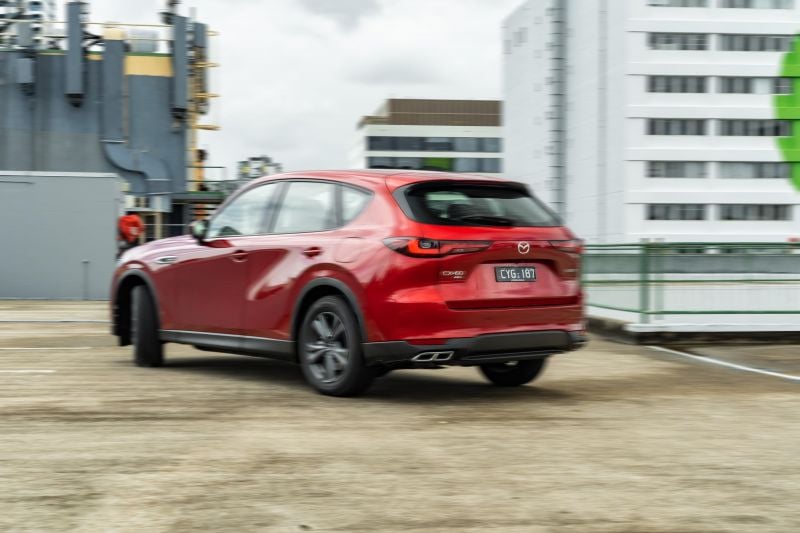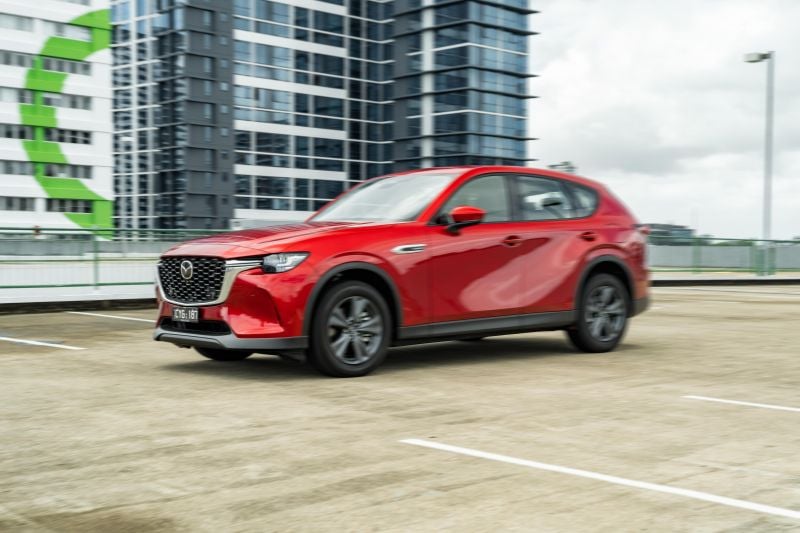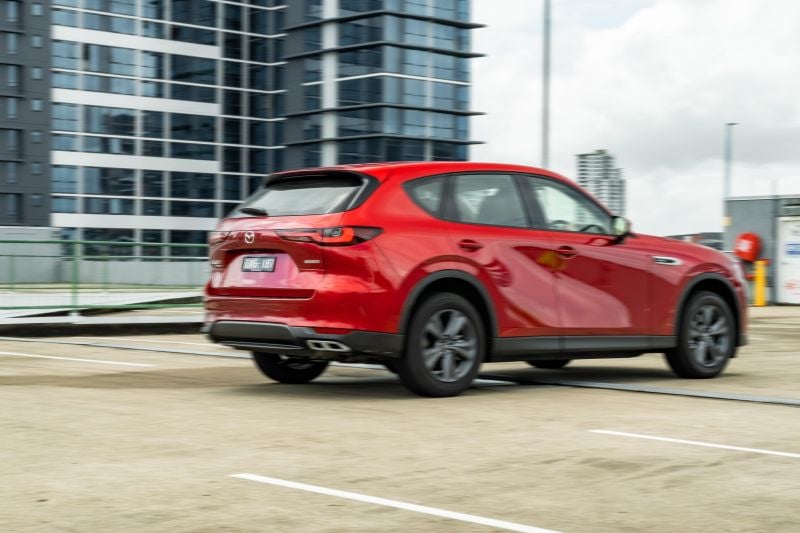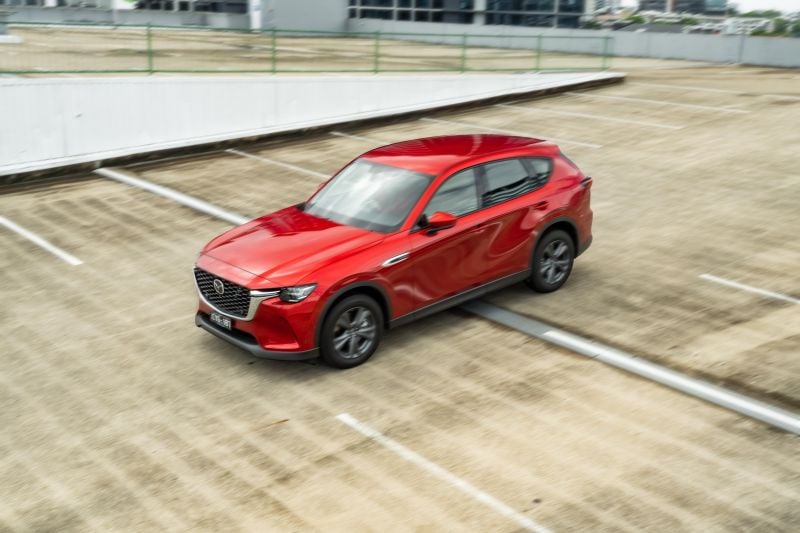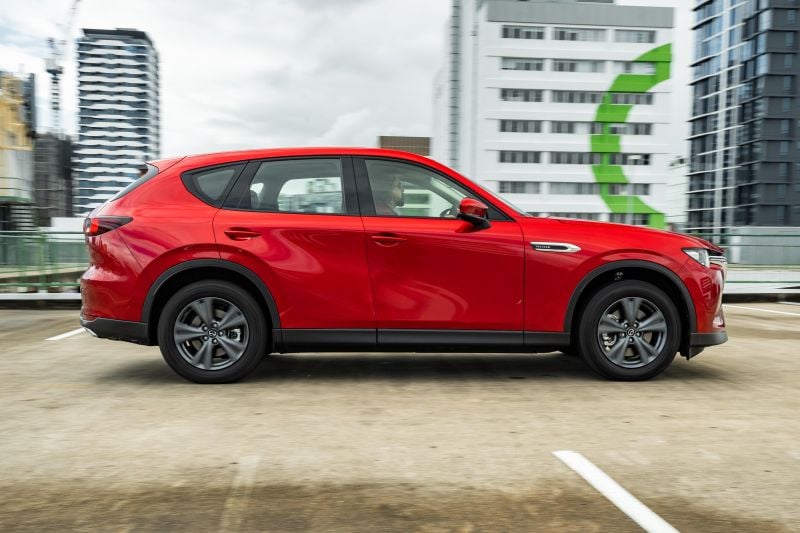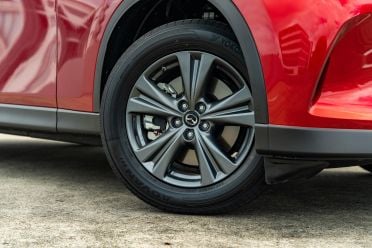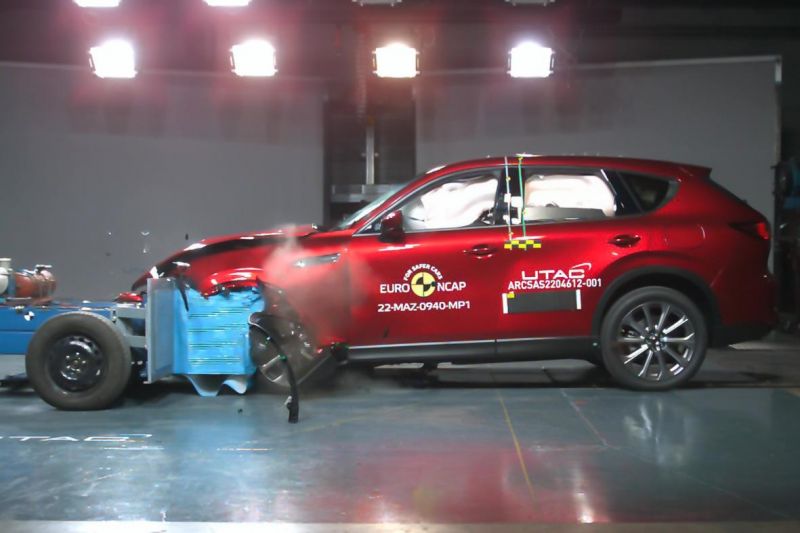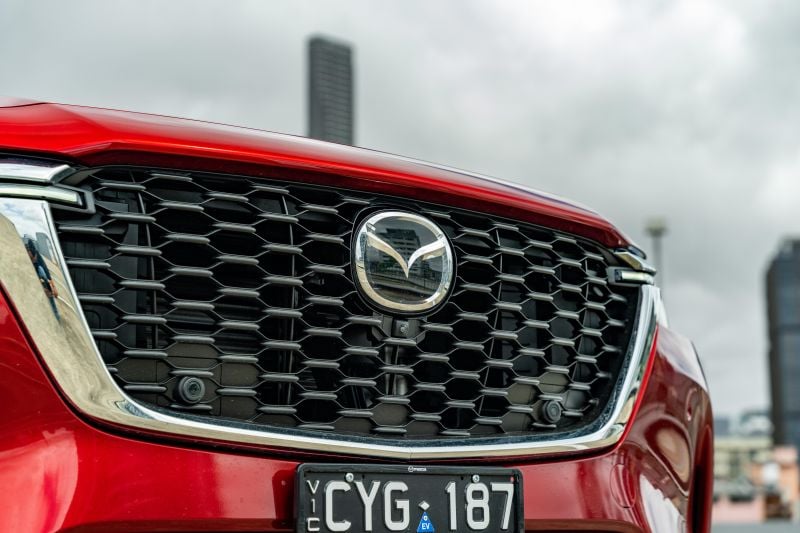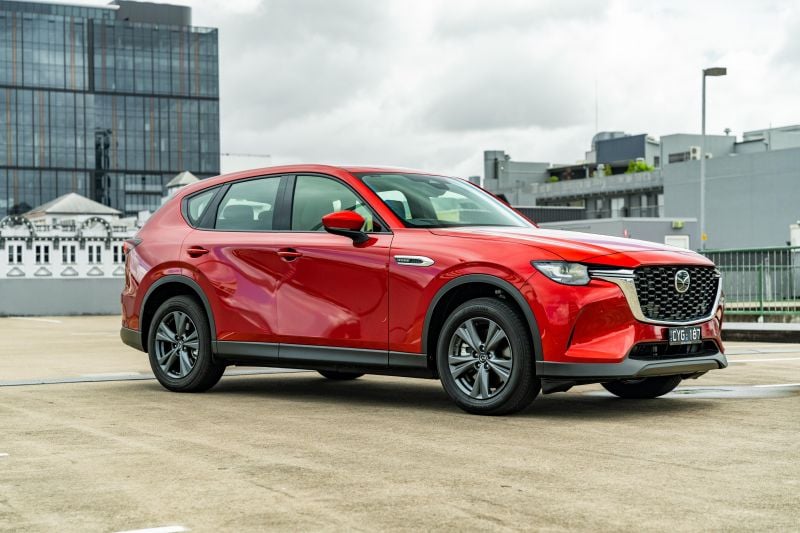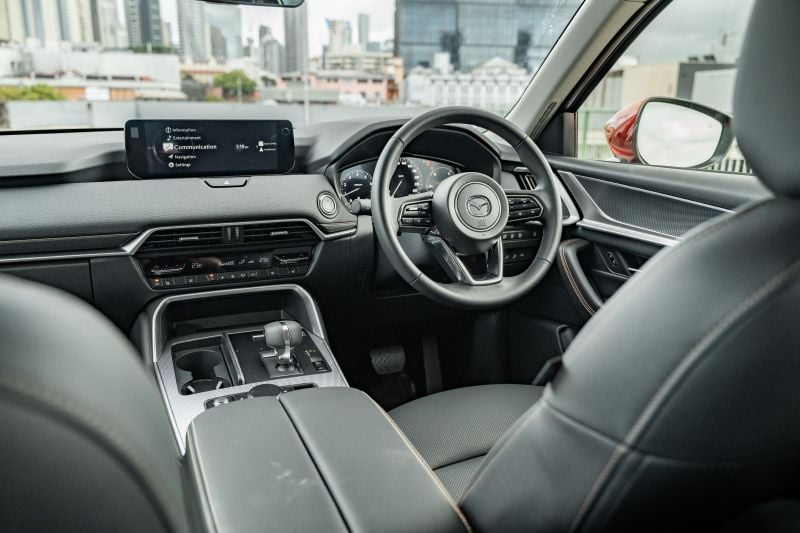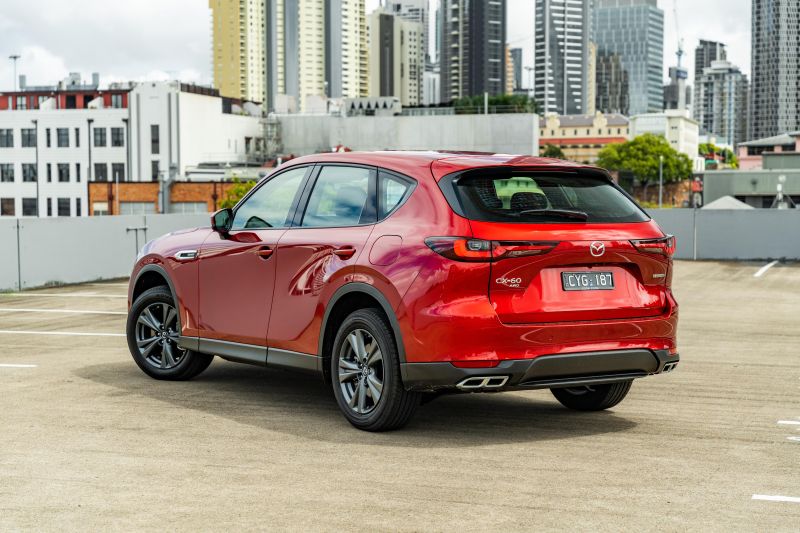For some time now, Mazdas have typically offered a more upmarket feel than rival brands.
Mazda is trying to build on that with its new family of Large Platform architecture SUVs, the first of which was the CX-60 launched here in 2023, which sit at a higher price point than the similarly sized SUVs they replace or complement in the lineup.
Mazda’s Large Platform SUVs are as close to clean-sheet as possible, riding a new rear/all-wheel drive chassis architecture, featuring new inline six-cylinder engines and a new eight-speed automatic and mild-hybrid system developed in-house.
Those specifications make them sound more like rivals for the likes of BMW than, say, Toyota, though Mazda Australia has avoided referring to these as luxury SUVs.
While the CX-60 range usually opens at $60,550, or $5550 more than a top-spec version of the also mid-sized CX-5, current promotional pricing puts the new SUV even closer to its older stablemate.
WATCH: Paul’s video review of the Mazda CX-60 G40e and D50e
Deal or no deal, is it worth the extra cash to step up from a CX-5?
Walking to the carpark to pick up the CX-60 for the first time, I mistook it for the CX-5, not helped by its use of Mazda’s lustrous but ubiquitous Soul Red Crystal paint.
Come around the front and you can see the long bonnet that, more than anything else, distinguishes the CX-60 from the CX-5. However, Mazda missed a trick by not giving this new model more distinctive styling.
The nameplate is already alphabet soup, no doubt confusing buyers, so some more unique styling would have been a wise choice to distinguish the CX-60. But while this more ambitious Mazda SUV looks like its more humble showroom-mate, the driving experience couldn’t be more different.
How does the Mazda CX-60 compare?
View a detailed breakdown of the Mazda CX-60 against similarly sized vehicles.

Mazda
CX-60
How much does the Mazda CX-60 cost?
The Mazda CX-60 is offered with a choice of mild-hybrid petrol (G40e), mild-hybrid diesel (D50e), and plug-in hybrid petrol (P50e) powertrains, all three of which are offered in base Evolve, mid-range GT and top-spec Azami trims.
Our base CX-60 wasn’t exactly base, with Mazda specifying the optional $4000 Luxury Package.
Still, current promotional pricing available in all states bar Western Australia sees the Evolve G40e – already the most affordable CX-60 – cost $56,990 drive-away.
Opting for the diesel powertrain adds an extra $2000, while the plug-in hybrid version is currently being offered for $70,040 drive-away.
You can view all current offers on the Mazda Australia website.
| Model | Price before on-road costs |
|---|---|
| Mazda CX-60 G40e Evolve | $60,550 |
| Mazda CX-60 D50e Evolve | $62,550 |
| Mazda CX-60 G40e GT | $68,550 |
| Mazda CX-60 D50e GT | $70,550 |
| Mazda CX-60 P50e Evolve | $73,600 |
| Mazda CX-60 G40e Azami | $73,750 |
| Mazda CX-60 D50e Azami | $75,750 |
| Mazda CX-60 P50e GT | $81,600 |
| Mazda CX-60 P50e Azami | $86,800 |
To see how the Mazda CX-60 lines up against its rivals, check out our comparison tool.
What is the Mazda CX-60 like on the inside?
The CX-60 has a nice interior, but given how high the CX-5 sets the bar for the mid-sized SUV segment we might have expected the CX-60 to aim just a little bit higher.
Still, the CX-60 holds its own against the likes of the Lexus NX. Material quality is impressive, with the dash top among the softest out there.
Soft padding can be found on the sides of the centre console, too, while the tops of the doors front and rear are soft-touch; the bottoms of the door cards aren’t, but that’s common for even premium mid-sized SUVs.
There’s mercifully no gloss black trim inside. The centre console instead uses a mixture of matte black plastic and metal-look trim, the latter of which has no real texture and is ultimately unconvincing.
There are also metal-look accents across the dashboard, but these don’t look especially authentic either.
The front of the dash is finished in an extremely soft material, which is nice, but it has a different graining to the rest of the dash, resulting in a somewhat disjointed look. On some more expensive CX-60s this section of the dash is finished in suede or cloth.
The Evolve is the only member of the CX-60 range to feature a 10.25-inch infotainment screen, with the GT and Azami featuring a 12.3-inch unit.
While both screens can be controlled with the rotary dial on the centre console, which proves intuitive, only the larger screen offers touch functionality for smartphone mirroring.
Anybody who has tried to use Apple CarPlay or Android Auto on a screen without touch functionality can attest it’s much more cumbersome than controlling these systems by touch.
The lack of touch functionality also underscores Mazda’s chopping and changing of its screen strategy.
The brand has gone from offering screens that could be touched while stationary, to banishing touch functionality altogether, to once again offering limited (but this time differently so) functionality. All three types of screens can still be found in Mazda’s current lineup.
There’s a traditional array of buttons for the climate control, while a volume knob can be found on the centre console along with shortcut buttons for the infotainment system.
As our tester had the optional Luxury Package, it featured a 12.3-inch digital instrument cluster. While there’s no ability to view maps on this screen, it features attractive graphics simulating a traditional analogue cluster.
Standard on all CX-60 models is a head-up display, and this is an excellent unit with all the information you need clearly visible. We also appreciate the classy typefaces found here and elsewhere in the CX-60, a subtle differentiation from lesser Mazdas.
Surprisingly, the base CX-60 lacks power adjustment and heating for the front seats, but our tester’s Luxury Package addresses these omissions.
The latest generation of cameras used in Mazda products are impressively high-resolution, with the optional Luxury Package bringing a see-through function for the standard surround-view camera.
In terms of storage, there are bottle holders in the doors plus a shallow centre console bin with a pair of USB-C outlets inside and a softly padded, split-opening lid.
Step out of the car and the walkaway locking function proves irritating – I could practically hug the car as you walk around to the other side and it would still lock, and yet on other occasions I’d walk away from the car and it wouldn’t lock. Best to just turn this function off.
Stepping into the back is easy, with the rear doors opening 90 degrees. Once inside, you’ll find plenty of headroom and legroom, and it does feel more spacious than a CX-5.
The driveline hump is also relatively flat, so legroom for the centre-seat occupant isn’t constricted too much.
In terms of amenities, there are rear air vents, two USB-C outlets, and a 220V/150W power outlet.
Child seats can be secured using the ISOFIX points on the two outboard seats, or via one of the three top-tether points.
Open the (power-assisted) tailgate and there’s a claimed 477L of cargo space including the underfloor storage space. This expands to 1726L with the 40/20/40-split rear bench folded flat or, rather, as flat as it can be.
There are helpful levers in the back that allow you to drop the seats, as well as a netted compartment to keep items from rolling away.
| Dimensions | Mazda CX-60 |
|---|---|
| Length | 4740mm |
| Width | 1949mm (mirrors folded) 2134mm (mirrors extended) |
| Height | 1675mm |
| Wheelbase | 2870mm |
| Cargo capacity | 477L (incl. under-floor space) 1726L (incl. under-floor space; second row folded) |
| Ground clearance | 170mm |
To see how the Mazda CX-60 lines up against its rivals, check out our comparison tool.
What’s under the bonnet?
The CX-60 on test here is powered by the inline-six petrol engine with mild-hybrid assistance.
| Specifications | Mazda CX-60 G40e MHEV |
|---|---|
| Engine | 3.3L turbo inline six with 48V mild-hybrid system |
| Power | 209kW @ 5000-6000rpm |
| Torque | 450Nm @ 2000-3500rpm |
| Transmission | 8-speed auto |
| Driven wheels | All-wheel drive |
| Weight | 1921kg (kerb) |
| Fuel economy (claimed) | 7.4L/100km |
| Fuel economy (as tested) | 9.5L/100km (inner-city, suburban and highway loop) 11.7L/100km (over a week, with urban skew) |
| Fuel tank capacity | 58L |
| Fuel requirement | 91 RON regular unleaded |
| CO2 emissions | 171g/km |
| Emissions standard | Euro 5 |
| Braked tow capacity | 2500kg (150kg tow-ball download) |
Petrol CX-60s are rated to tow 500kg more than their diesel counterparts.
They have 22kW more power than diesel models, but are down 100Nm of torque. They also use more fuel – diesel models have claimed fuel consumption of 4.9L/100km.
How does the Mazda CX-60 drive?
The Mazda CX-60 might look like a CX-5 but it sure doesn’t feel like one to drive.
Push the start button and there’s a beefy sound from the inline six under the bonnet. A green ‘Ready’ icon flashes a few times before you can move the clunky shifter, while the surround-view camera provides a crystal-clear view of your surrounds as you pull out of your parking space.
Here’s where the CX-60 hits its first hurdle. At low speeds, the steering doesn’t seem to lighten up, which makes navigating a carpark a bit of a chore. The steering is simply too heavy and that, combined with the sound of the engine and the delay off the line (more on that later), makes this car feel big, heavy and dull.
There’s an annoying low-speed jerkiness to the transmission, with the CX-60 heaving repeatedly and dramatically on one occasion as I drove up my sloped driveway onto the street.
This jerkiness continues as you creep through traffic, with the vehicle audibly thunking as you slow down to stop at, for example, a set of traffic lights.
The automatic idle stop/start function isn’t particularly smooth either, though turning it off doesn’t resolve these low-speed driveability issues.
Getting back into my own car after driving this, I found myself waiting for the clunk as I slowed down before realising my car’s eight-speed auto is a much better unit…
When the light turns green and you punch it, you’ll find the CX-60 really doesn’t feel all that quick for something with a turbocharged six, even if it does weigh over 1900kg.
Plant your right foot and let the engine come on song, though, and the CX-60 proves to have good mid-range response and the transmission seems to eventually pull itself together.
Drive the CX-60 along any surface short of, say, the world’s largest billiard table, however, and you’ll find it rides very stiffly.
Mazda rolled out an update earlier this year to fit a revised rear shock absorber, with existing CX-60 owners also able to take advantage of this at its dealers.
Without driving pre- and post-update vehicles back-to-back, it’s hard to tell exactly how much the ride has improved. The CX-60 still, however, transmits every bump into the cabin.
No SUV should ride this stiffly unless it has, say, M Competition badging on the tailgate. The CX-60 has the ability to make what appears to be a smooth surface feel scarred, as if the suspension is doing a topographical study of the roadway.
It squirms like a cat you’re trying to dress in pyjamas, and never feels settled. Hit an expansion joint and you get a thunk. Surface changes are keenly felt.
Here’s one specific example. There’s a road I test cars on where the surface dips down slightly for a low bridge across a creek, and then dips up again ever so slightly when the bridge ends; the speed limit here is 80km/h.
On most comparable cars, the transition from road to bridge sees them take a moment to settle, with one rebound motion. The CX-60, however, was hugely upset, rebounding sharply and markedly around two or three times.
The Mazda also often feels unsettled at the rear, with sharper bumps appearing to jostle it not only up and down but side to side.
The ride could best be described as stiff but bouncy – not an ideal combination.
Around town, this doesn’t feel like a premium mid-sized SUV and, perhaps more gallingly, it doesn’t feel like a Mazda either. Take the CX-60 to a winding mountain road, however, and it starts to shine.
That steering that felt so cumbersome in the carpark? The weighting feels satisfying, if still heavy, and the road feel it transmits is most welcome.
The brake pedal feel is lacking, but otherwise this was a delight to drive along switchbacks and through hairpin turns.
The CX-60 feels planted in corners, with a centre of gravity that appears so low you may forget you’re driving an SUV.
Some of the roads were slick from recent showers, but the CX-60 never felt lacking for grip even if you can feel the subtle rear bias of this all-wheel drive system.
With the CX-60’s high level of noise suppression, knocking it into Sport mode – where it will hold gears for longer, as is typical of these modes – didn’t see the cabin dominated by engine noise. That means you can enjoy a spirited drive in relative peace.
Get onto the highway and you’ll find the cabin to be quite serene. There’s minimal wind and tyre noise at high speeds, with engine noise well suppressed.
The suite of active safety and driver assist systems is a mixed bag.
The lane-keep assist does a good job of nudging you back in your lane, though the lane centring isn’t as impressive. Some rivals feature systems that do a better job of keeping you centred, and on one curve in the road it just gave up and said Steering Assist Not Available.
We like the neat graphics in the digital instrument cluster, however, which includes a graphical depiction of the vehicle and surrounding traffic, with green outlining your lane.
Front cross-traffic alert works well, but I’ve still yet to find when this is useful unless you’re a really oblivious driver, with the chimes just sounding whenever someone drives past you in the carpark or while you’re waiting to turn.
The traffic sign recognition is very clever. Not only does it show you the current speed limit, it also warns you well ahead of time what the speed limit is about to change to.
The automatic high-beam is a bit sensitive, and we found it dipping on roads with no street lights and no oncoming traffic.
What do you get?
There are three trim levels. On test here is the entry-level Evolve G40e.
Mazda CX-60 Evolve highlights:
- 18-inch alloy wheels
- Space-saver spare (petrol and diesel only)
- Tyre repair kit (PHEV)
- Electric parking brake
- Auto hold
- Hill descent control
- Automatic stop/start
- LED headlights
- Automatic high-beam
- Heated, power-folding exterior mirrors
- Power windows with auto up/down for all windows
- Power tailgate
- Rain-sensing wipers
- Proximity entry with push-button start
- Head-up display
- 7.0-inch instrument cluster screen (petrol and diesel only)
- 12.3-inch digital instrument cluster (PHEV only)
- 10.25-inch infotainment system
- Wireless and wired Apple CarPlay and Android Auto
- DAB+ digital radio
- Satellite navigation
- Wireless phone charger
- 8-speaker sound system
- Dual-zone climate control
- Leather-wrapped steering wheel and shifter
- Tilt and telescopic steering wheel adjustment
- Maztex leatherette upholstery in black
- Manually adjustable front seats
- 40/20/40 split fold rear seats
- 150W power outlet (1500W in PHEV)
To see how the Mazda CX-60 lines up against its rivals, check out our comparison tool.
Options
Two optional packages are available for the CX-60 Evolve.
The optional Vision Technology Package (Evolve, GT; $2000) adds:
- Surround-view camera with see-through view
- Adaptive LED headlights (GT)
- 12.3-inch digital instrument cluster (Evolve)
- Cruising & Traffic Support
- Front cross-traffic alert
- Driver monitoring (Evolve only)
The Luxury Package (Evolve; $4000) features all of the Vision Technology Package additions for the Evolve, plus:
- Heated front seats
- Power-adjustable front seats with driver’s memory
- Black leather upholstery
- Exterior mirror memory
Is the Mazda CX-60 safe?
The Mazda CX-60 has a five-star safety rating from ANCAP based on testing conducted in 2022.
| Category | Mazda CX-60 |
|---|---|
| Adult occupant protection | 34.82 out of 38 (91 per cent) |
| Child occupant protection | 46.00 out of 49 (93 per cent) |
| Vulnerable road user protection | 48.18 out of 54 (89 per cent) |
| Safety assist | 12.32 out of 16 (77 per cent) |
Standard safety equipment includes:
- Adaptive cruise control
- Autonomous emergency braking
- Pedestrian detection
- Cyclist detection
- Rear AEB
- Rear crossing function
- Turn-across traffic function
- Blind-spot monitoring
- Lane-keep assist
- Safe exit warning
- Driver attention alert
- Rear cross-traffic alert
- Surround-view camera
- Traffic sign recognition
- Tyre pressure monitoring
- Front and rear parking sensors
- Dual front airbags
- Front and rear side airbags
- Front and rear curtain airbags
- Driver’s far-side and knee airbags
GT adds:
- Driver attention monitoring
Azami adds:
- Cruising and Traffic Support
- Front cross-traffic alert
How much does the Mazda CX-60 cost to run?
The CX-60 is covered by a five-year, unlimited-kilometre warranty.
| Running costs | Mazda CX-60 |
|---|---|
| Warranty | Five-year, unlimited-kilometre |
| Roadside assistance | Five years |
| Service intervals | 12 months or 15,000km |
| Capped-price servicing | Seven years |
| Total capped-price service cost | $4696 |
To see how the Mazda CX-60 lines up against its rivals, check out our comparison tool.
CarExpert’s Take on the Mazda CX-60
The Mazda CX-60 is a missed opportunity for the brand, but I’m an optimist. This vehicle could be fixed and become a truly compelling alternative to premium mid-sized SUVs.
While the idea of simply putting in the 2.5-litre turbo four and six-speed automatic from the CX-5 is tempting, we suspect Mazda engineers could recalibrate this transmission and mild-hybrid system to improve refinement.
We also believe these engineers could retune the suspension to make this more comfortable. Tweak the steering for a lighter weighting at low speeds and the CX-60 would be in the hunt.
A turbocharged inline-six Mazda on a rear-biased all-wheel drive platform should be a lot more satisfying to drive than this, even if the CX-60 does boast a great chassis.
There’s no question the CX-60 handles well, it’s just that switchbacks and hairpin turns make up such a small portion of the average owner’s driving. What matters more is powertrain smoothness and ride comfort for the urban grind, and in both areas the CX-60 falls short.
If it seems like I’m being hard on Mazda, it’s because I know the company is eminently capable of building vehicles that are dynamic but also smooth and refined – its own CX-5 G35 is just one example.
Right after I returned the CX-60, I got behind the wheel of a top-spec CX-5 with the turbo four and was struck by just how responsive the powertrain is and how the suspension, while still firm, doesn’t crash over bumps.
Given the CX-5 G35 also offers most of the space and an interior only slightly less posh for a lower price, that’s where my money would be going.
Let’s see what Mazda has in store for the CX-60’s eventual update.
Interested in buying a Mazda CX-60? Get in touch with one of CarExpert’s trusted dealers here
Click the images for the full gallery
MORE: Everything Mazda CX-60



